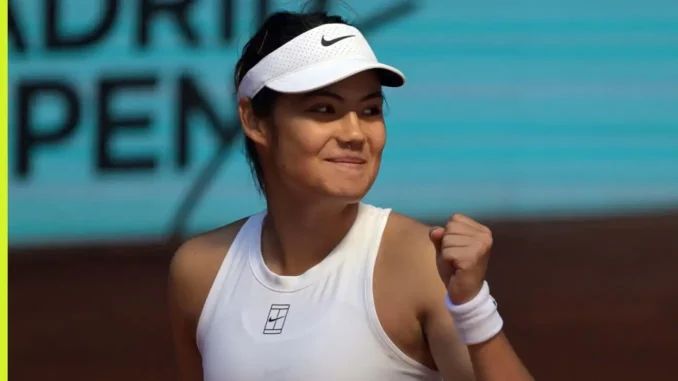
In a gripping display of resilience and adaptability, Emma Raducanu powered through a challenging second-round match at the Italian Open in Rome, securing a straight-sets victory over Jil Teichmann with a score of 6-2, 6-4. The match, which unfolded on the clay courts of the Foro Italico, was anything but straightforward, marked by a last-minute opponent change that tested the young Briton’s mental fortitude. Raducanu, the 2021 US Open champion, described the encounter as a “mental” challenge, highlighting the unique pressures of adjusting to an unexpected adversary.
Originally slated to face Russia’s Ekaterina Alexandrova, Raducanu learned of the switch to Teichmann just hours before the match due to Alexandrova’s withdrawal from the tournament. This abrupt change forced the 22-year-old to recalibrate her strategy swiftly, a task she admitted was daunting. “It’s a completely different challenge,” Raducanu said post-match, reflecting on the shift. “You prepare for one player, and then you’re facing someone with a different style. It’s mental, but I’m really proud of how I handled it.” Her ability to adapt on such short notice underscored her growing maturity as a competitor on the WTA Tour.
The match itself showcased Raducanu’s blend of aggressive play and defensive tenacity. In the first set, she dominated with precise groundstrokes and a commanding presence at the net, breaking Teichmann’s serve twice to claim a 6-2 victory in just 35 minutes. Her movement on the clay, a surface where she has historically faced challenges, appeared fluid and confident, a testament to her ongoing efforts to master the slower, grittier courts. The crowd, though sparse due to the match’s scheduling on an outer court, roared in approval as Raducanu sealed the set with a blistering forehand winner.
The second set proved more contentious. Teichmann, a seasoned clay-court player ranked outside the top 100, elevated her game, capitalizing on Raducanu’s occasional lapses in focus. The Swiss player broke early, putting pressure on the Briton to respond. Raducanu, however, dug deep, relying on her improved serve—honed under the guidance of her informal coach Mark Petchey, who was absent due to broadcasting duties—and a relentless return game. “I had to stay sharp and fight for every point,” Raducanu noted, emphasizing the intensity of the battle. She clawed back to level the set at 4-4, breaking Teichmann with a perfectly executed drop shot that left her opponent stranded.
As the match neared its climax, Raducanu’s composure shone through. Serving at 5-4, she faced a tense moment when Teichmann earned a break point, but a well-placed ace and a powerful backhand down the line snuffed out the threat. Moments later, she sealed the victory when Teichmann’s final return sailed long, prompting a relieved smile from Raducanu as she clasped her cap in a gesture of gratitude toward the cheering fans. “The crowd was amazing, even though it was a smaller court,” she said. “Their support really pushed me over the finish line.”
This victory marks another step forward for Raducanu, who has faced a rollercoaster of challenges since her US Open triumph, including injuries, coaching changes, and the pressure of heightened expectations. Her recent performances, including a gritty first-round win over Australian qualifier Maya Joint in a three-set marathon, suggest a player rediscovering her competitive spark. Against Joint, Raducanu battled a cold and a late-night finish, yet her 7-5, 6-7, 6-3 triumph demonstrated her ability to persevere under adversity. “It was really difficult to close that match out,” she had said, crediting the late-night crowd for their encouragement.
Raducanu’s journey in Rome now leads her to the third round, where she faces a sterner test against a higher-ranked opponent. Her performance against Teichmann, particularly her ability to navigate the mental hurdles of an unexpected matchup, bodes well for her prospects. Watched over by mentor Jane O’Donoghue, Raducanu appears to be embracing a freer, more expressive style of play, unburdened by the rigid structures she has sometimes encountered in her coaching setups. “I’m just trying to let my creativity come out,” she remarked earlier in the tournament, a philosophy that seems to be paying dividends.
As the Italian Open progresses, Raducanu’s resilience and adaptability will be key. The clay courts of Rome, a prelude to the French Open later in May, offer her a chance to build momentum and refine her game. For now, her victory over Teichmann stands as a testament to her ability to rise above challenges, both tactical and psychological, cementing her status as a formidable force in women’s tennis. With each match, Raducanu is not just winning points but also proving her capacity to thrive under pressure, a quality that could carry her far in this tournament and beyond.
Leave a Reply